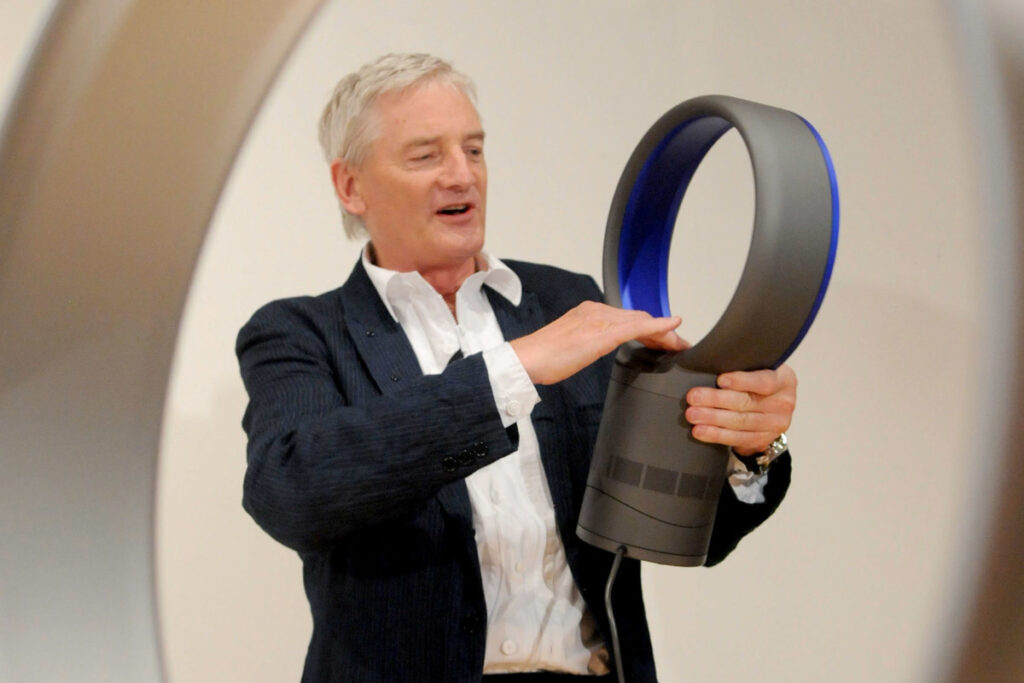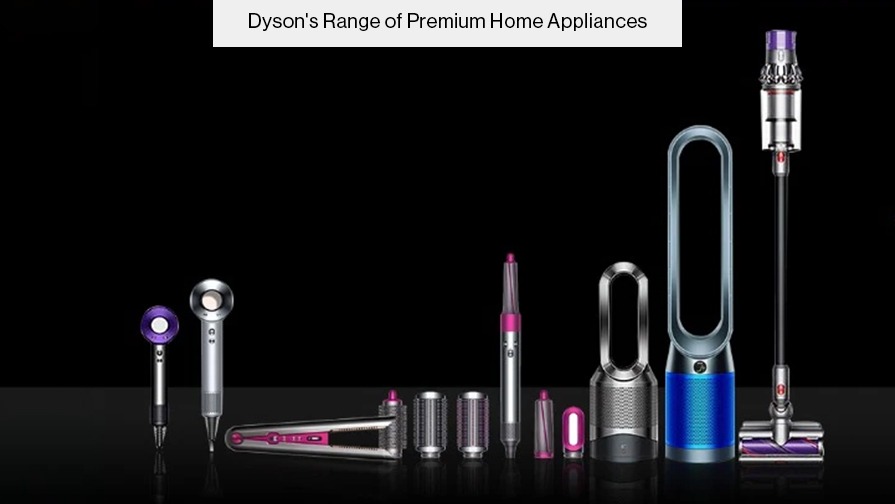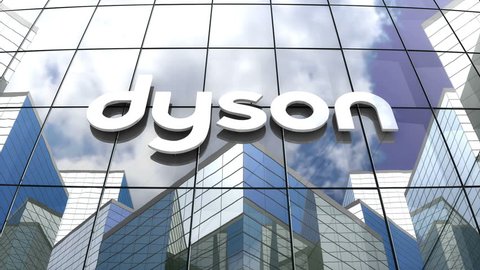Dyson is a British technology company based in Singapore that was founded by Sir James Dyson. The company is known for its innovative products, particularly its line of vacuum cleaners, which use a unique cyclonic separation technology to improve suction power and eliminate the need for traditional filters. The company has since expanded to other product categories, including haircare, lighting, and hand dryers.
Dyson has sold over 100 million vacuum cleaners worldwide since the launch of its first model, the DC01, in 1993. The company has over 15,000 employees worldwide, with operations in over 80 countries.
Dyson spends around £7 million ($9.6 million) per week on research and development, and has over 5,000 engineers and scientists working on new products and technologies. The company has over 7,000 patents and patent applications worldwide, covering a wide range of technologies including cyclonic separation, air purification, and solid-state batteries.
Dyson has won numerous awards for its products over the years, including over 200 design awards and 14 Red Dot Awards in 2020 alone. The company has expanded beyond vacuum cleaners to other product categories, including haircare, lighting, and hand dryers.
In 2020, Dyson launched its first electric vehicle, the Dyson EV, but later abandoned the project citing high costs and low profitability.
Dyson is committed to sustainability, with a goal of becoming carbon-neutral by 2025. The company is investing in new technologies such as solid-state batteries and electric motors to help achieve this goal.
In 2019, Dyson opened its flagship store on Oxford Street in London, which features interactive displays and demonstrations of the company’s products.
History of Dyson
Dyson was founded by Sir James Dyson in 1991. However, the company’s origins go back several years before its official founding, as James Dyson spent years experimenting with vacuum cleaner designs in his garage.

In the late 1970s, James Dyson became frustrated with the limitations of traditional vacuum cleaners, which tended to lose suction power as the bag or filter filled up with dust and debris. He began experimenting with different designs, eventually creating a vacuum cleaner that used a cyclonic separation technology to improve suction power and eliminate the need for filters. This technology involves creating a powerful vortex within the vacuum cleaner that separates dust and debris from the air, allowing for more efficient and powerful cleaning.
Dyson spent several years developing his vacuum cleaner design, creating dozens of prototypes and seeking funding to bring his product to market. However, he faced numerous setbacks and rejections before finally securing investment from Japanese company Apex in 1991. With this funding, Dyson was able to launch his first vacuum cleaner, the DC01, in 1993.
The DC01 was an immediate success, selling over 50,000 units in the first year alone. Dyson continued to innovate and expand, introducing new products and technologies, such as bladeless fans and air purifiers. The company’s focus on design and innovation has been a key part of its success, with Dyson winning numerous awards for its products over the years.
In addition to its focus on innovation, Dyson has also been committed to sustainability and environmental responsibility. In 2007, the company launched its “Future Proofing” initiative, which aims to reduce its environmental impact by improving the energy efficiency of its products, reducing waste, and using sustainable materials. Dyson has also committed to becoming carbon-neutral by 2025, and has invested in new technologies such as solid-state batteries to help achieve this goal.
Dyson Products – A vision of future
Here is an overview of some of the products offered by Dyson:
Vacuum Cleaners: Dyson is best known for its innovative vacuum cleaners, which use cyclonic separation technology to improve suction power and eliminate the need for filters. The company offers a wide range of vacuum cleaners for different purposes, including cordless and handheld models for portability, and robot vacuums for automated cleaning.
Air Purifiers: Dyson’s air purifiers use a range of advanced technologies to remove pollutants and allergens from the air, including HEPA filters and activated carbon filters. Some models also use ultraviolet light to kill bacteria and viruses.
Fans and Heaters: Dyson’s bladeless fans and heaters use air multiplier technology to create a powerful stream of air that can be used for cooling or heating. The company offers a variety of models for different needs, including desk fans, tower fans, and portable heaters.
Hair Care: Dyson’s hair care products use advanced technologies to help users achieve salon-quality results at home. The company offers a range of hair dryers, straighteners, and curling irons, all of which feature innovative design and advanced features such as intelligent heat control.
Lighting: Dyson’s lighting products use advanced LED technology to provide bright and energy-efficient lighting. The company offers a range of lamps and light fixtures for different needs, including task lighting, ambient lighting, and mood lighting.
Hand Dryers: Dyson’s hand dryers use high-speed air jets to dry hands quickly and hygienically. The company’s Airblade technology is designed to be more efficient and hygienic than traditional hand dryers, with models available for different environments such as restrooms and commercial settings.
Airwrap: Dyson’s Airwrap is a hair styling tool that uses air to curl, wave, smooth and volumize hair, without extreme heat.

Overall, Dyson products are known for their innovative design, advanced technology, and high-quality performance. The company’s focus on innovation and sustainability has made it a leader in the technology and home appliance industries, and its products are used by millions of people around the world.
Marketing Strategies of Dyson – A Mix of Innovation & Campaigns
Dyson has revolutionized the home appliance industry with its innovative products and marketing strategies. Following factors are important part of Dyson’s marketing strategies:
Focusing on Innovation:
Dyson’s marketing strategy is built around innovation. The company’s founder, Sir James Dyson, has always been focused on developing new and better ways to solve everyday problems. Dyson products are designed with unique features and technologies that set them apart from competitors, and the company’s marketing emphasizes these innovative features. For example, Dyson’s vacuum cleaners are marketed as being more powerful and efficient than traditional models, while its air purifiers are marketed as being more effective at removing pollutants and allergens from the air.
Creating a Unique Brand Image:
Dyson has also focused on creating a unique brand image that sets it apart from competitors. The company’s products have a distinctive design that is instantly recognizable, with sleek lines and bold colors. Dyson’s marketing emphasizes this design, with product images and videos that showcase the products’ aesthetics. Additionally, Dyson has created a brand personality that is associated with innovation, quality, and performance. This personality is reinforced through marketing materials that emphasize the company’s commitment to excellence and its willingness to challenge traditional approaches.
Providing Exceptional Customer Service:
Another key component of Dyson’s marketing strategy is providing exceptional customer service. Dyson offers a range of customer support services, including online chat, phone support, and in-person help at retail locations. The company also offers a two-year warranty on its products, which is longer than many of its competitors. This focus on customer service helps to build trust and loyalty among Dyson’s customer base.
Partnering with Influencers:
Dyson has also been successful in partnering with influencers to promote its products. The company has worked with a range of influencers in different industries, including home design, fashion, and beauty. These influencers create content that showcases Dyson products in action, highlighting their unique features and benefits. This content is then shared on social media, helping to increase brand awareness and drive sales.
Investing in Advertising:
Finally, Dyson has invested heavily in advertising to build brand awareness and drive sales. The company’s advertising campaigns are often bold and memorable, featuring eye-catching visuals and innovative approaches. For example, Dyson’s “Get the Most Out of Your Vacuum” campaign used playful imagery and humor to encourage consumers to use their Dyson vacuums to the fullest. Dyson has also invested in high-profile sponsorships, such as its partnership with the Royal College of Art in London.
Overall, Dyson’s marketing strategies have been successful in building a strong brand image, increasing brand awareness, and driving sales. The company’s focus on innovation, design, and customer service has helped to differentiate it from competitors and establish a loyal customer base.
Also Read: The Man Your Man Could Smell Like: A Case Study on Old Spice Branding Campaign
Growth and Revenue of Dyson
According to a report by Forbes in 2021, Dyson’s revenue for the fiscal year ending in December 2020 was $12.6 billion, up from $11.3 billion in the previous year. This represented a growth rate of around 11%. While Dyson’s revenue growth slowed down in 2020 due to the COVID-19 pandemic, the company’s revenue has generally been on an upward trajectory over the years.
Dyson’s revenue is largely driven by sales of its home appliances, such as vacuum cleaners, air purifiers, and hair dryers. The company has also expanded into new markets in recent years, such as electric vehicles and personal care products.
One of the factors contributing to Dyson’s revenue growth is its focus on innovation. The company invests heavily in research and development to create new products and improve existing ones. For example, Dyson’s latest vacuum cleaner, the Dyson V15 Detect, features a laser that can detect and measure small particles, making it more effective at cleaning carpets and floors. Dyson’s air purifiers also use advanced filtration technology to remove pollutants and allergens from the air.
Another factor driving Dyson’s revenue growth is its global expansion. The company operates in more than 80 countries worldwide, with a strong presence in markets such as the United States, China, and Japan. Dyson has also opened a number of flagship stores in key cities around the world, which serve as showcase spaces for its products.
Dyson’s revenue growth has been accompanied by expansion in its workforce. The company currently employs more than 15,000 people worldwide, with a significant portion of its workforce dedicated to research and development. Dyson also operates several manufacturing facilities around the world, including in the UK, Malaysia, and Singapore.
In conclusion, Dyson’s revenue and growth have been driven by its focus on innovation, global expansion, and investment in research and development. While the company faces competition in the home appliance market, Dyson’s unique product features, design, and marketing strategies have helped it to establish a strong brand image and loyal customer base.
Controversies around Dyson
While Dyson is known for its innovative products and success in the home appliance market, the company has also been the subject of controversies and criticism over the years. Here are some of the key controversies that have surrounded Dyson:
Tax Controversy: Dyson has faced criticism for its tax arrangements in the UK. In 2019, the company moved its corporate headquarters from the UK to Singapore, which sparked controversy over its tax payments. Critics argued that Dyson’s move was motivated by tax avoidance, although the company has denied these claims.
Product Reliability: Dyson products have been criticized for their reliability, particularly in the early years of the company’s existence. Some consumers have reported issues with Dyson vacuums breaking down or malfunctioning, which has led to some negative reviews and complaints. However, the company has worked to improve the reliability of its products over time.
Intellectual Property Disputes: Dyson has been involved in several high-profile intellectual property disputes with other companies. For example, in 2013, Dyson sued Samsung for allegedly copying the design of its vacuum cleaners. The case was settled out of court, but it highlighted the competitive pressures in the home appliance market.
Brexit Controversy: In the lead-up to the UK’s 2016 Brexit referendum, Dyson’s founder, James Dyson, was a prominent supporter of leaving the EU. However, the company faced criticism for its reliance on EU workers, who make up a significant portion of its workforce in the UK. Some critics argued that Dyson’s support for Brexit was hypocritical given its reliance on EU workers and its access to EU markets.
Environmental Concerns: While Dyson products are designed to be energy-efficient and environmentally friendly, the company has faced criticism over its manufacturing processes and supply chain. Some critics have raised concerns about the environmental impact of the materials used in Dyson products, as well as the carbon footprint of the company’s manufacturing facilities.
In conclusion, while Dyson has enjoyed great success in the home appliance market, it has also faced controversies and criticism over the years. These controversies have ranged from tax arrangements and intellectual property disputes to concerns about product reliability and environmental impact. Despite these challenges, Dyson has continued to innovate and grow its business, and it remains a key player in the global home appliance market.
Future of Dyson
The future of Dyson looks promising, as the company continues to innovate and expand into new markets. Here are some key factors that are likely to shape Dyson’s future:
Continued Innovation: Dyson is known for its focus on innovation, and this is likely to continue to drive the company’s success in the future. The company invests heavily in research and development, and is always looking for new ways to improve its existing products and create new ones. Dyson is likely to continue to focus on areas such as electric vehicles, artificial intelligence, and robotics, as it seeks to stay at the forefront of technological innovation.
Expansion into New Markets: In recent years, Dyson has expanded into new markets beyond home appliances, such as electric vehicles and personal care products. This diversification is likely to continue in the future, as the company looks for new opportunities for growth. Dyson may also continue to expand its retail footprint, with plans to open more flagship stores in key cities around the world.
Sustainability: Dyson has made a commitment to sustainability, and this is likely to continue to be a key focus in the future. The company is working to reduce the environmental impact of its products and manufacturing processes, and has set targets for reducing its carbon footprint. Dyson is also likely to continue to invest in sustainable materials and technologies, as it seeks to create products that are both innovative and environmentally friendly.
Competition: As the home appliance market continues to grow and evolve, Dyson is likely to face increased competition from other companies. This includes traditional home appliance manufacturers, as well as new players in the market. Dyson’s ability to differentiate itself through innovation, design, and brand image will be key to its success in the face of increased competition.
In conclusion, the future of Dyson looks bright, as the company continues to innovate, expand into new markets, and focus on sustainability. While Dyson may face challenges in the form of competition and changing consumer preferences, its focus on innovation and brand image are likely to help it stay ahead of the curve in the home appliance market.
To read more content like this, subscribe to our newsletter



